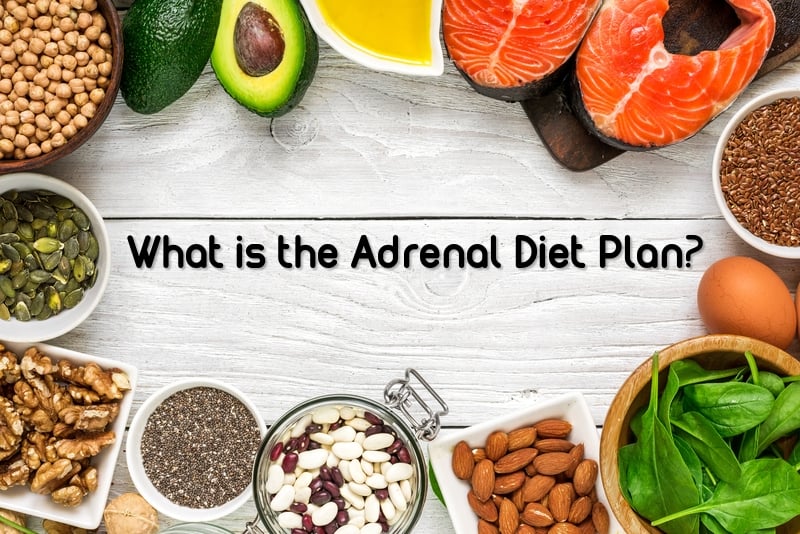Adrenal Diet Plan: How It Works To Help Reduce Body Stress

If you’ve been searching for an adrenal diet plan (there’s a good chance that’s what brought you here today), then chances are you are really looking for one of two things (possibly both):
- A diet plan to help with adrenal fatigue
- A diet plan to help reduce stubborn belly fat
In the case of the former, I implore you to start by reading this piece on adrenal fatigue, a term that is, at best, a misnomer. Often, the issue is adrenal insufficiency, or perhaps even more likely, a circadian mismatch that involves the loss of the normal cortisol circadian rhythm. 1 (Cortisol levels should be high early in the morning and low at the time of sleep.)
The other main reason you may be here is because you feel like you have a disproportionate amount of belly fat. This is often referred to as an apple-shaped body or adrenal body type because of the connection between stress (and the stress-hormone cortisol) and belly fat accumulation.
Either way, the use of “adrenal” in either of these contexts (and most marketing contexts for that matter) imply that the root of the problem is stress/cortisol.
The great news is that this adrenal diet plan can help with both scenarios because it’s not just some “eat this, not that” fad diet. It’s a holistic approach to nourishing your body with healthy doses of food, movement, rest and relaxation, social connections, and recharging interventions.
But first, let’s get a better understanding of stress and how it affects the body.
Stress: A Double-Edged Sword
Many people celebrate stress and pride themselves on being busy. In fact, a good deal of folks would tell you they wouldn’t know what to do with themselves if they weren’t so busy.
The fact of the matter, however, is that stress is distracting, and it can prevent you from making smart decisions and thinking clearly and proactively. Even more, stress can have negative effects on wellbeing, learning, focus, relationships, communication, body composition, and virtually all other domains of life.
Make no mistake about it, though, some stress is important. It’s called eustress, and we wouldn’t get better in any area of life without it (e.g., learn, get stronger, grow). Good stress is short-lived, infrequent, is over quickly, can be part of a positive life experience, inspires you to action, and leaves you better off than you were before.
On the other hand, bad stress, which is called distress, lasts a long time, is chronic and ongoing, is negative, depressing, and demoralizing, demotivates and paralyzes you, and breaks you down, leaving you worse off than you were before.
And it’s when this distress beats you down over time that problems arise. In fact, chronic stress can negatively affect every bodily system, for example, making you:
- Dumb, distracted, and a poor decision maker
- Clumsy and uncoordinated
- Tired (affecting all aspects of sleep, including your ability to fall asleep, stay asleep, and go back to sleep after waking)
- Bloated and lead to leaky gut
- Anxious, moody, and irritable
- Sick (more likely to catch a cold, as well as trigger other health issues)
- And fat. Yes, stress can make you fat.
Is Stress Making You Fat?
Although the relationship is complex and highly individual, stress can lead to fat gain and influence how you store fat. In other words, stress may contribute to fat gain directly and indirectly.
On one hand, studies have shown that folks with high waist-hip ratios (read: more belly fat and the ol’ “apple-shaped” body) tend to have poor coping skills and secrete more of the “stress hormone” cortisol when faced with a stressful situation. This suggests a relationship between cortisol and abdominal fat accumulation. Additional studies have identified a similar association between cortisol concentrations, coping skills, chronic stress, and excess belly fat. 2,3
Pardon me as I geek out for a moment. There are a number of potential explanations for the stress-cortisol-belly fat connection. For instance, the enzyme (i.e., HSD) that “activates” cortisol from its inactive form (i.e., cortisone) is more prevalent in visceral fat than subcutaneous fat tissue. 4
What’s more, visceral fat tissue has greater blood flow and four times as many cortisol receptors (compared to subcutaneous).3 Even more, research shows that cortisol increases lipogenesis, which is the process of fat synthesis and storage. 5
It’s no secret that stress can be a “trigger” for overeating, and stress has been associated with higher caloric intake, increased saturated fat and sugar consumption, and poor diet quality.6 In fact, research shows that around 70% of individuals increase their food intake during periods of stress. 7,8
Females, overweight individuals, and folks who think about food or body weight obsessively are more likely to eat when stressed. 9 As one might expect, research also shows that stress-induced eating typically involves a predisposition for high-sugar and high-fat foods, which are “comfort foods” known to provide strong rewarding effects and reinforce snacking. 10
The Adrenal Diet Plan
So, if you’re carrying some excess belly fat—if you have an adrenal body type—what can you do? Fortunately, there are multiple useful and effective tools that can help with managing stress, reducing belly fat, and normalizing cortisol rhythms.
Before diving in, the adrenal diet plan is a bit of a misnomer. While what, when, and how much you eat can be powerful tools, food alone is only going to get you part of the way there. As is the case with improving any area of health, wellness, and performance, the approach is comprehensive.
That said, start where you are and make adjustments as you are ready, willing, and able. While most people’s journeys will be multi-faceted, something is almost always better than nothing.
Creating a Positive Identity
Your identity is the type of person you believe you are. If you want to change your behavior and build better habits, you often have to start with believing new things about yourself.
Changing your self-limiting beliefs isn’t nearly as hard as you might think. According to James Clear, author of Atomic Habits, it’s a two-step process. First, decide the type of person you want to be. Second, prove it to yourself with small wins.
Instead of thinking…I’m the type of person who’s busy and stressed all the time, think…I’m the type of person who’s productive and resilient. Instead of thinking…I’m the type of person who suffers with adrenal fatigue, think…I’m the type of person who takes care of her body.
Then, make a list of five small steps you can take to become this person. Fortunately, the following steps work incredibly well for this exact step in the process.
Manage Stressful Thoughts
The goal is not to completely eliminate stress. It’s to become a stress-management ninja. It’s about choosing your battles in a calculated manner, so the stress you’re exposed to is short in duration and promotes healthy adaptation.
And when those negative stressors surface and accumulate, you’re equipped with a set of strategies that help you feel in control, buffering the burden you would have previously experienced. Here are some of the most powerful tools from the stress-management toolbox:
- Setting boundaries; learning to say “no”
- Reframing; looking at the bright side
- Exercise and yoga
- Meditation
- Breath work
- Gratitude
- Prayer and believing in a higher power
- Grounding and earthing
- Spending time in nature; forest bathing
- Connecting with others
- Laughing
- Singing, dancing, humming, and chanting
- Hot and cold therapy
- Massage
- Acupuncture
Creating a Nutrition Plan
Not surprisingly, what, when, and how you eat can all have a significant, direct impact on fat-storage patterns, including how much belly fat you carry. 11,12 Studies show that when you combine regular physical activity with a reduced-calorie diet, you’ll drop MORE belly fat than if you did either on its own. 13,14
Research suggests that reduced-calorie diets (regardless of macronutrient composition) are effective at slashing belly fat. With that said, reduced-calorie diets that are higher in protein (i.e., > 0.5 grams of protein per pound of body weight per day) and “control” carbohydrates (i.e., <40% of calories from carbohydrate) may be most effective at reducing belly fat. 15–18
Carbohydrates are an important part of the adrenal diet plan. While a low-carb diet is an effective and particularly trendy tool to support weight loss, it’s not ideal for those with disrupted cortisol.
And a big reason for that lies in one of the primary physiological functions of cortisol. For instance, cortisol (which belongs to the glucocorticoid family of hormones) has a profound effect on blood sugar regulation, as its role is to liberate glucose when blood sugar levels are low.
Armed with this understanding, you can time your meals and carbs in a more adrenal-friendly manner. Specifically, you might eat low-carb (or even fast) in the morning when cortisol should naturally be at its peak.
On the other side of the coin, you might consume the lion’s share of your daily (healthy) carbs in the evening. Shocker, I know, but the higher-carb meal in the evening can help promote the decline in cortisol naturally seen at night.
You want to choose smart carbs, though, because poor insulin sensitivity and carbohydrate tolerance are also closely tied to excess belly fat. There’s also evidence that suggests that diets rich in refined carbohydrates (e.g., refined grains, added sugars) may selectively promote the storage of belly fat. 11,12
How you eat can also play a tremendous role in the process. Eating slowly and mindfully is essentially a form of food meditation that can help you eat less without feeling deprived as well as naturally promote the body’s “rest and digest” branch of the nervous system.
As far as what to eat, the ultimate recipe often varies between and within individuals. In other words, what works for one person may not work for you. And, as your body evolves over time, you may be able to consume a more diverse diet. A good place to start is to emphasize whole, minimally processed, anti-inflammatory foods.
Exercising
A sedentary lifestyle, an overall lack of physical activity, and low levels of fitness are associated with excess belly fat. Fortunately, a substantial body of evidence suggests that a combination of resistance training and aerobic conditioning (including moderate and intense cardiovascular activity) can help reduce belly fat. 19,20
Now, don’t overdo it, especially with a bunch of long-duration cardio or too much high-intensity work. That may make matters worse. In addition to structured exercise, incorporate copious amounts of low-intensity, non-exercise physical activity, such as walking.
Getting Solid Sleep
Wouldn’t it be nice if I could just tell you that you need seven to nine hours of sleep? As if the missing piece of the puzzle is information and you don’t already know that sleep is important, right? That must feel like a slap in the face.
I know you know that sleep is important. I want you to know that I know that it’s not that easy. While you may not be able to control exactly what happens when your head hits the pillow, you can—and need to—take charge of your sleep hygiene.
Here’s a pretty exhaustive list of sleep hygiene habits. Light, time, temperature, and activity are some of the biggest pieces of the puzzle to pay attention to. Make your bedroom a dark, cool, and quiet sanctuary. Turn off electronics at least an hour before bedtime. Get outside during the day, and be mindful of light exposure at night.
Grounding and Earthing
I know I already mentioned this one, but it bears repetition because it’s so powerful. One of the ways that grounding the human body to earth (i.e., earthing) works is by resynchronizing cortisol hormone secretion in alignment with the natural 24-hour circadian rhythm. 21,22 In other words, grounding is a linchpin for re-establishing healthy cortisol rhythms, which is essential for healthy adrenal function and stress management.
The easiest, most accessible way to incorporate grounding is by walking barefoot outside. You can also buy a wide variety of grounding products that allow you to sit, work, or sleep indoors connected to conductive systems that transfer energy from the ground into the body.
Supplements
Here are some of the top supplements to help when you’re feeling stressed, as they can help with stress management as well as providing support for healthy adrenal function:
- Magnesium
- L-Theanine
- Phosphatidylserine
- CBD
- Rhodiola rosea
- Ashwagandha
- Relora
- GABA
- Glycine
- Melatonin
Brings whole new meaning to the phrase, “Take a chill pill,” doesn’t it?
Adrenal Diet Plan Wrap-Up
Whether you identify as having an adrenal body type or adrenal fatigue, the adrenal diet plan can help. It’s a holistic approach to nourishing your body with healthy doses of food, movement, rest and relaxation, social connections, and recharging interventions to help support stress management, healthy cortisol rhythms, and healthy adrenal function.








